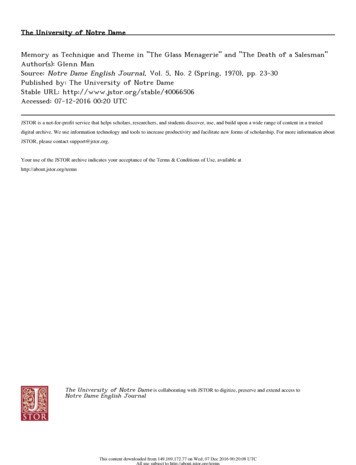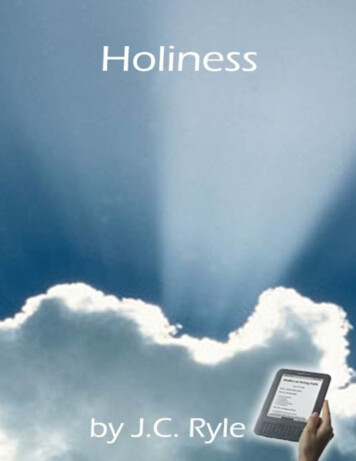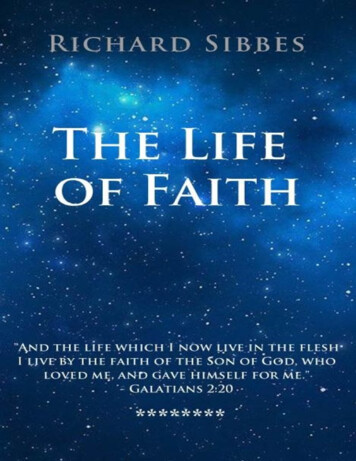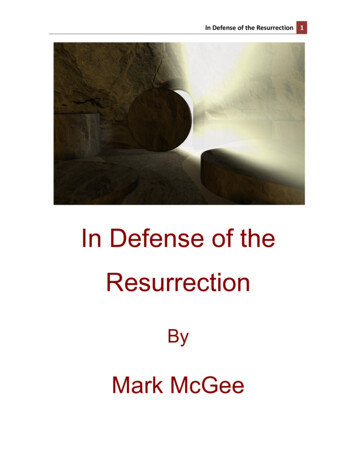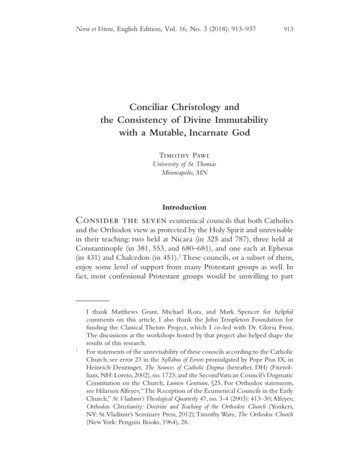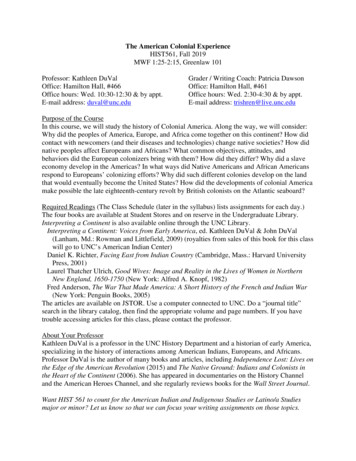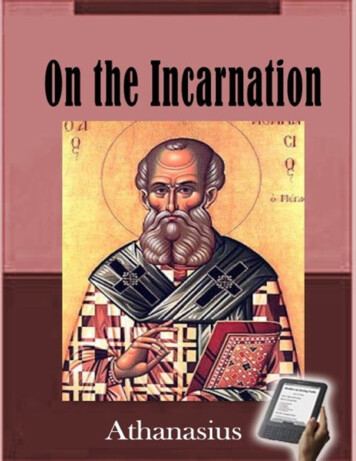
Transcription
Athanasius:On the IncarnationDe Incarnatione Verbi DeiQuoted scriptures have been lightly modernizedThis translation was made by Sister Penelope Lawson, of the Anglican Community of St. Marythe Virgin in Wantage, England. It was originally published with a byline that reads only“Translated and edited by A Religious of C.S.M.V.”With Introduction by C. S. LewisSource: http://www.spurgeon.org/ phil/history/ath-inc.htmAthanasius stood contra mundum (“against the world”) in defense of the biblical doctrine ofChrist. He opposed Arius when it seemed all the world would follow Arius’s heresy.Athanasius’s work remains even today one of the definitive statements of orthodoxTrinitarianism.
ContentsIntroduction1 Creation and the Fall2 The Divine Dilemma and Its Solution in the Incarnation3 The Divine Dilemma and Its Solution in the Incarnation — continued4 The Death of Christ5 The Resurrection6 Refutation of the Jews7 Refutation of the Gentiles8 Refutation of the Gentiles — continued9 Conclusion
Introductionby C. S. LewisThere is a strange idea abroad that in every subject the ancient booksshou ld be read only by the professionals, and that the amateur shouldcontent himself with the modern books. Thus I have found as a tutor inEnglish Literature that if the average student wants to find out somethingabout Platonism, the very last thing he thinks of doing is to take atranslation of Plato off the library shelf and read the Symposium. Hewould rather read some dreary modern book ten times as long, all about“isms” and influences and only once in twelve pages telling him whatPlato actually said. The error is rather an amiable one, for it springs fromhumility. The student is half afraid to meet one of the great philosophersface to face. He feels himself inadequate and thinks he will notunderstand him. But if he only knew, the great man, just because of hisgreatness, is much more intelligible than his modern commentator. Thesimplest student will be able to understand, if not all, yet a very great dealof what Plato said; but hardly anyone can understand some modernbooks on Platonism. It has always therefore been one of my mainendeavours as a teacher to persuade the young that firsthand knowledgeis not only more worth acquiring than secondhand knowledge, but isusually much easier and more delightful to acquire.This mistaken preference for the modern books and this shyness of theold ones is nowhere more rampant than in theology. Wherever you find alittle study circle of Christian laity you can be almost certain that they arestudying not St. Luke or St. Paul or St. Augustine or Thomas Aquinas orHooker or Butler, but M. Berdyaev or M. Maritain or M. Niebuhr or MissSayers or even myself.Now this seems to me topsy-turvy. Naturally, since I myself am a writer, Ido not wish the ordinary reader to read no modern books. But if he mustread only the new or only the old, I would advise him to read the old. AndI would give him this advice precisely because he is an amateur andtherefore much less protected than the expert against the dangers of anexclusive contemporary diet. A new book is still on its trial and theamateur is not in a position to judge it. It has to be tested against thegreat body of Christian thought down the ages, and all its hiddenimplications (often unsuspected by the author himself) have to bebrought to light. Often it cannot be fully understood without the
knowledge of a good many other modern books. If you join at eleveno’clock a conversation which began at eight you will often not see the realbearing of what is said. Remarks which seem to you very ordinary willproduce laughter or irritation and you will not see why — the reason, ofcourse, being that the earlier stages of the conversation have given them aspecial point. In the same way sentences in a modern book which lookquite ordinary may be directed at some other book; in this way you maybe led to accept what you would have indignantly rejected if you knew itsreal significance. The only safety is to have a standard of plain, centralChristianity (“mere Christianity” as Baxter called it) which puts thecontroversies of the moment in their proper perspective. Such a standardcan be acquired only from the old books. It is a good rule, after reading anew book, never to allow yourself another new one till you have read anold one in between. If that is too much for you, you should at least readone old one to every three new ones.Every age has its own outlook. It is specially good at seeing certain truthsand specially liable to make certain mistakes. We all, therefore, need thebooks that will correct the characteristic mistakes of our own period. Andthat means the old books. All contemporary writers share to some extentthe contemporary outlook — even those, like myself, who seem mostopposed to it. Nothing strikes me more when I read the controversies ofpast ages than the fact that both sides were usually assuming withoutquestion a good deal which we should now absolutely deny. They thoughtthat they were as completely opposed as two sides could be, but in factthey were all the time secretly united — united with each other andagainst earlier and later ages — by a great mass of common assumptions.We may be sure that the characteristic blindness of the twentieth century— the blindness about which posterity will ask, “But how could they havethought that?” — lies where we have never suspected it, and concernssomething about which there is untroubled agreement between Hitlerand President Roosevelt or between Mr. H. G. Wells and Karl Barth.None of us can fully escape this blindness, but we shall certainly increaseit, and weaken our guard against it, if we read only modern books. Wherethey are true they will give us truths which we half knew already. Wherethey are false they will aggravate the error with which we are alreadydangerously ill. The only palliative is to keep the clean sea breeze of thecenturies blowing through our minds, and this can be done only byreading old books. Not, of course, that there is any magic about the past.
People were no cleverer then than they are now; they made as manymistakes as we. But not the same mistakes. They will not flatter us in theerrors we are already committing; and their own errors, being now openand palpable, will not endanger us. Two heads are better than one, notbecause either is infallible, but because they are unlikely to go wrong inthe same direction. To be sure, the books of the future would be just asgood a corrective as the books of the past, but unfortunately we cannotget at them.I myself was first led into reading the Christian classics, almostaccidentally, as a result of my English studies. Some, such as Hooker,Herbert, Traherne, Taylor and Bunyan, I read because they arethemselves great English writers; others, such as Boethius, St. Augustine,Thomas Aquinas and Dante, because they were “influences.” GeorgeMacdonald I had found for myself at the age of sixteen and never waveredin my allegiance, though I tried for a long time to ignore his Christianity.They are, you will note, a mixed bag, representative of many Churches,climates and ages. And that brings me to yet another reason for readingthem. The divisions of Christendom are undeniable and are by some ofthese writers most fiercely expressed. But if any man is tempted to think— as one might be tempted who read only con- temporaries — that“Christianity” is a word of so many meanings that it means nothing at all,he can learn beyond all doubt, by stepping out of his own century, thatthis is not so. Measured against the ages “mere Christianity” turns out tobe no insipid interdenominational transparency, but something positive,self-consistent, and inexhaustible. I know it, indeed, to my cost. In thedays when I still hated Christianity, I learned to recognise, like some alltoo familiar smell, that almost unvarying something which met me, nowin Puritan Bunyan, now in Anglican Hooker, now in Thomist Dante. Itwas there (honeyed and floral) in Francois de Sales; it was there (graveand homely) in Spenser and Walton; it was there (grim but manful) inPascal and Johnson; there again, with a mild, frightening, Paradisialflavour, in Vaughan and Boehme and Traherne. In the urban sobriety ofthe eighteenth century one was not safe — Law and Butler were two lionsin the path. The supposed “Paganism” of the Elizabethans could not keepit out; it lay in wait where a man might have supposed himself safest, inthe very centre of The Faerie Queene and the Arcadia. It was, of course,varied; and yet — after all — so unmistakably the same; recognisable, notto be evaded, the odour which is death to us until we allow it to become
life:An air that killsFrom yon far country blows.We are all rightly distressed, and ashamed also, at the divisions ofChristendom. But those who have always lived within the Christian foldmay be too easily dispirited by them. They are bad, but such people donot know what it looks like from without. Seen from there, what is leftintact despite all the divisions, still appears (as it truly is) an immenselyformidable unity. I know, for I saw it; and well our enemies know it. Thatunity any of us can find by going out of his own age. It is not enough, butit is more than you had thought till then. Once you are well soaked in it, ifyou then venture to speak, you will have an amusing experience. You willbe thought a Papist when you are actually reproducing Bunyan, aPantheist when you are quoting Aquinas, and so forth. For you have nowgot on to the great level viaduct which crosses the ages and which looks sohigh from the valleys, so low from the mountains, so narrow comparedwith the swamps, and so broad compared with the sheep-tracks.The present book is something of an experiment. The translation isintended for the world at large, not only for theological students. If itsucceeds, other translations of other great Christian books willpresumably follow. In one sense, of course, it is not the first in the field.Translations of the Theologia Germanica, the Imitation, the Scale ofPerfection, and the Revelations of Lady Julian of Norwich, are already onthe market, and are very valuable, though some of them are not veryscholarly. But it will be noticed that these are all books of devotion ratherthan of doctrine. Now the layman or amateur needs to be instructed aswell as to be exhorted. In this age his need for knowledge is particularlypressing. Nor would I admit any sharp division between the two kinds ofbook. For my own part I tend to find the doctrinal books often morehelpful in devotion than the devotional books, and I rather suspect thatthe same experience may await many others. I believe that many who findthat “nothing happens” when they sit down, or kneel down, to a book ofdevotion, would find that the heart sings unbidden while they areworking their way through a tough bit of theology with a pipe in theirteeth and a pencil in their hand.This is a good translation of a very great book. St. Athanasius has sufferedin popular estimation from a certain sentence in the “Athanasian Creed.”
I will not labour the point that that work is not exactly a creed and wasnot by St. Athanasius, for I think it is a very fine piece of writing. Thewords “Which Faith except every one do keep whole and undefiled,without doubt he shall perish everlastingly” are the offence. They arecommonly misunderstood. The operative word is keep; not acquire, oreven believe, but keep. The author, in fact, is not talking aboutunbelievers, but about deserters, not about those who have never heardof Christ, nor even those who have misunderstood and refused to acceptHim, but of those who having really understood and really believed, thenallow themselves, under the sway of sloth or of fashion or any otherinvited confusion to be drawn away into sub-Christian modes of thought.They are a warning against the curious modern assumption that allchanges of belief, however brought about, are necessarily exempt fromblame. But this is not my immediate concern. I mention “the creed(commonly called) of St. Athanasius” only to get out of the reader’s waywhat may have been a bogey and to put the true Athanasius in its place.His epitaph is Athanasius contra mundum, “Athanasius against theworld.” We are proud that our own country has more than once stoodagainst the world. Athanasius did the same. He stood for the Trinitariandoctrine, “whole and undefiled,” when it looked as if all the civilisedworld was slipping back from Christianity into the religion of Arius —into one of those “sensible” synthetic religions which are so stronglyrecommended today and which, then as now, included among theirdevotees many highly cultivated clergymen. It is his glory that he did notmove with the times; it is his reward that he now remains when thosetimes, as all times do, have moved away.When I first opened his De Incarnatione I soon discovered by a verysimple test that I was reading a masterpiece. I knew very little ChristianGreek except that of the New Testament and I had expected difficulties.To my astonishment I found it almost as easy as Xenophon; and only amaster mind could, in the fourth century, have written so deeply on sucha subject with such classical simplicity. Every page I read confirmed thisimpression. His approach to the Miracles is badly needed today, for it isthe final answer to those who object to them as “arbitrary andmeaningless violations of the laws of Nature.” They are here shown to berather the re-telling in capital letters of the same message which Naturewrites in her crabbed cursive hand; the very operations one would expectof Him who was so full of life that when He wished to die He had to
“borrow death from others.” The whole book, indeed, is a picture of theTree of Life — a sappy and golden book, full of buoyancy and confidence.We cannot, I admit, appropriate all its confidence today. We cannot pointto the high virtue of Christian living and the gay, almost mocking courageof Christian martyrdom, as a proof of our doctrines with quite thatassurance which Athanasius takes as a matter of course. But whoevermay be to blame for that it is not Athanasius.The translator knows so much more Christian Greek than I that it wouldbe out of place for me to praise her version. But it seems to me to be inthe right tradition of English translation. I do not think the reader willfind here any of that sawdusty quality which is so common in modernrenderings from the ancient languages. That is as much as the Englishreader will notice; those who compare the version with the original willbe able to estimate how much wit and talent is presupposed in such achoice, for example, as “these wiseacres” on the very first page.C. S. LEWIS.
1Creation and the Fall1(1) In our former book we dealt fully enough with a few of the chiefpoints about the heathen worship of idols, and how those false fearsoriginally arose. We also, by God’s grace, briefly indicated that the Wordof the Father is Himself divine, that all things that are owe their being toHis will and power, and that it is through Him that the Father gives orderto creation, by Him that all things are moved, and through Him that theyreceive their being. Now, Macarius, true lover of Christ, we must take astep further in the faith of our holy religion, and consider also the Word’sbecoming Man and His divine Appearing in our midst. That mystery theJews traduce, the Greeks deride, but we adore; and your own love anddevotion to the Word also will be the greater, because in His Manhood Heseems so little worth. For it is a fact that the more unbelievers pour scornon Him, so much the more does He make His Godhead evident. Thethings which they, as men, rule out as impossible, He plainly shows to bepossible; that which they deride as unfitting, His goodness makes mostfit; and things which these wiseacres laugh at as “human” He by Hisinherent might declares divine. Thus by what seems His utter poverty andweakness on the cross He overturns the pomp and parade of idols, andquietly and hiddenly wins over the mockers and unbelievers to recognizeHim as God.Now in dealing with these matters it is necessary first to recall what hasalready been said. You must understand why it is that the Word of theFather, so great and so high, has been made manifest in bodily form. Hehas not assumed a body as proper to His own nature, far from it, for asthe Word He is without body. He has been manifested in a human bodyfor this reason only, out of the love and goodness of His Father, for thesalvation of us men. We will begin, then, with the creation of the worldand with God its Maker, for the first fact that you must grasp is this: therenewal of creation has been wrought by the Self-same Word Who madeit in the beginning. There is thus no inconsistency between creation andsalvation for the One Father has employed the same Agent for bothworks, effecting the salvation of the world through the same Word Whomade it in the beginning.2) In regard to the making of the universe and the creation of all things
there have been various opinions, and each person has propounded thetheory that suited his own taste. For instance, some say that all things areself- originated and, so to speak, haphazard. The Epicureans are amongthese; they deny that there is any Mind behind the universe at all. Thisview is contrary to all the facts of experience, their own existenceincluded. For if all things had come into being in this automatic fashion,instead of being the outcome of Mind, though they existed, they would allbe uniform and without distinction. In the universe everything would besun or moon or whatever it was, and in the human body the whole wouldbe hand or eye or foot. But in point of fact the sun and the moon and theearth are all different things, and even within the human body there aredifferent members, such as foot and hand and head. This distinctness ofthings argues not a spontaneous generation but a prevenient Cause; andfrom that Cause we can apprehend God, the Designer and Maker of all.Others take the view expressed by Plato, that giant among the Greeks. Hesaid that God had made all things out of pre-existent and uncreatedmatter, just as the carpenter makes things only out of wood that alreadyexists. But those who hold this view do not realize that to deny that God isHimself the Cause of matter is to impute limitation to Him, just as it isundoubtedly a limitation on the part of the carpenter that he can makenothing unless he has the wood. How could God be called Maker andArtificer if His ability to make depended on some other cause, namely onmatter itself? If He only worked up existing matter and did not Himselfbring matter into being, He would be not the Creator but only acraftsman.Then, again, there is the theory of the Gnostics, who have invented forthemselves an Artificer of all things other than the Father of our LordJesus Christ. These simply shut their eyes to the obvious meaning ofScripture. For instance, the Lord, having reminded the Jews of thestatement in Genesis, “The One who created them in the beginning madethem male and female.”, and having shown that, for that reason, a manshould leave his parents and cling to his wife, goes on to say withreference to the Creator, “What therefore God has joined together, let no2man put asunder.” How can they get a creation independent of theFather out of that? And, again, St. John, speaking all inclusively, says,3“All things became by Him and without Him nothing came into being.How then could the Artificer be someone different, other than, the Father
of Christ?3) Such are the notions which men put forward. But the impiety of theirfoolish talk is plainly declared by the divine teaching of the Christianfaith. From it we know that, because there is Mind behind the universe, itdid not originate itself; because God is infinite, not finite, it was not madefrom pre-existent matter, but out of nothing and out of non-existenceabsolute and utter God brought it into being through the Word. He saysas much in Genesis: “In the beginning God created the heavens and the4earth; and again through that most helpful book The Shepherd, “Believefirst and foremost that there is One God Who created and arranged all5things and brought them out of non-existence into being.” Paul alsoindicates the same thing when he says, “By faith we understand that theworlds were framed by the Word of God, so that the things which we seenow, did not come into being out of things which had previously6appeared.” For God is good — or rather, of all goodness He isFountainhead, and it is impossible for one who is good to be mean orgrudging about anything. Grudging existence to none therefore, He madeall things out of nothing through His own Word, our Lord Jesus Christand of all these His earthly creatures He reserved especial mercy for therace of men. Upon them, therefore, upon men who, as animals, wereessentially impermanent, He bestowed a grace which other creatureslacked — namely the impress of His own Image, a share in the reasonablebeing of the very Word Himself, so that, reflecting Him and themselvesbecoming reasonable and expressing the Mind of God even as He does,though in limited degree they might continue for ever in the blessed andonly true life of the saints in paradise. But since the will of man couldturn either way, God secured this grace that He had given by making itconditional from the first upon two things — namely, a law and a place.He set them in His own paradise, and laid upon them a singleprohibition. If they guarded the grace and retained the loveliness of theiroriginal innocence, then the life of paradise should be theirs, withoutsorrow, pain or care, and after it the assurance of immortality in heaven.But if they went astray and became vile, throwing away their birthright ofbeauty, then they would come under the natural law of death and live nolonger in paradise, but, dying outside of it, continue in death and incorruption. This is what Holy Scripture tells us, proclaiming thecommand of God, “Of every tree that is in the garden you shall surely eat,but of the tree of the knowledge of good and evil you shall not eat, but in
7the day that you do eat, you shall surely die.” “You shall surely die” — notjust die only, but remain in the state of death and of corruption.4) You may be wondering why we are discussing the origin of men whenwe set out to talk about the Word’s becoming Man. The former subject isrelevant to the latter for this reason: it was our sorry case that caused theWord to come down, our transgression that called out His love for us, sothat He made haste to help us and to appear among us. It is we who werethe cause of His taking human form, and for our salvation that in Hisgreat love He was both born and manifested in a human body. For Godhad made man thus (that is, as an embodied spirit), and had willed thathe should remain in incorruption. But men, having turned from thecontemplation of God to evil of their own devising, had come inevitablyunder the law of death. Instead of remaining in the state in which Godhad created them, they were in process of becoming corrupted entirely,and death had them completely under its dominion. For thetransgression of the commandment was making them turn back againaccording to their nature; and as they had at the beginning come intobeing out of non-existence, so were they now on the way to returning,through corruption, to non-existence again. The presence and love of theWord had called them into being; inevitably, therefore when they lost theknowledge of God, they lost existence with it; for it is God alone Whoexists, evil is non-being, the negation and antithesis of good. By nature, ofcourse, man is mortal, since he was made from nothing; but he bears alsothe Likeness of Him Who is, and if he preserves that Likeness throughconstant contemplation, then his nature is deprived of its power and heremains incorrupt. So is it affirmed in Wisdom: “The keeping of His laws8is the assurance of incorruption.” And being incorrupt, he would behenceforth as God, as Holy Scripture says, “I have said, You are gods andsons of the Highest, all of you: but you die as men and fall as one of the9princes.”5) This, then, was the plight of men. God had not only made them out ofnothing, but had also graciously bestowed on them His own life by thegrace of the Word. Then, turning from eternal things to thingscorruptible, by counsel of the devil, they had become the cause of theirown corruption in death; for, as I said before, though they were by naturesubject to corruption, the grace of their union with the Word made themcapable of escaping from the natural law, provided that they retained the
beauty of innocence with which they were created. That is to say, thepresence of the Word with them shielded them even from naturalcorruption, as also Wisdom says: God created man for incorruption andas an image of His own eternity; but by envy of the devil, death entered10into the world.” When this happened, men began to die, and corruptionran riot among them and held sway over them to an even more thannatural degree, because it was the penalty of which God had forewarnedthem for transgressing the commandment. Indeed, they had in theirsinning surpassed all limits; for, having invented wickedness in thebeginning and so involved themselves in death and corruption, they hadgone on gradually from bad to worse, not stopping at any one kind of evil,but continually, as with insatiable appetite, devising new kinds of sins.Adulteries and thefts were everywhere, murder and rapine filled theearth, law was disregarded in corruption and injustice, all kinds ofiniquities were perpetrated by all, both singly and in common. Cities werewarring with cities, nations were rising against nations, and the wholeearth was rent with factions and battles, while each strove to outdo theother in wickedness. Even crimes contrary to nature were not unknown,but as the martyr-apostle of Christ says: “Their women changed thenatural use into that which is against nature; and the men also, leavingthe natural use of the woman, flamed out in lust towards each other,perpetrating shameless acts with their own sex, and receiving in their11own persons the due recompense of their pervertedness.”
2The Divine Dilemma and Its Solution in theIncarnation(6) We saw in the last chapter that, because death and corruption weregaining ever firmer hold on them, the human race was in process ofdestruction. Man, who was created in God’s image and in his possessionof reason reflected the very Word Himself, was disappearing, and thework of God was being undone. The law of death, which followed fromthe Transgression, prevailed upon us, and from it there was no escape.The thing that was happening was in truth both monstrous and unfitting.It would, of course, have been unthinkable that God should go back uponHis word and that man, having transgressed, should not die; but it wasequally monstrous that beings which once had shared the nature of theWord should perish and turn back again into non-existence throughcorruption. It was unworthy of the goodness of God that creatures madeby Him should be brought to nothing through the deceit wrought uponman by the devil; and it was supremely unfitting that the work of God inmankind should disappear, either through their own negligence orthrough the deceit of evil spirits. As, then, the creatures whom He hadcreated reasonable, like the Word, were in fact perishing, and such nobleworks were on the road to ruin, what then was God, being Good, to do?Was He to let corruption and death have their way with them? In thatcase, what was the use of having made them in the beginning? Surely itwould have been better never to have been created at all than, havingbeen created, to be neglected and perish; and, besides that, suchindifference to the ruin of His own work before His very eyes would arguenot goodness in God but limitation, and that far more than if He hadnever created men at all. It was impossible, therefore, that God shouldleave man to be carried off by corruption, because it would be unfittingand unworthy of Himself.7) Yet, true though this is, it is not the whole matter. As we have alreadynoted, it was unthinkable that God, the Father of Truth, should go backupon His word regarding death in order to ensure our continuedexistence. He could not falsify Himself; what, then, was God to do? WasHe to demand repentance from men for their transgression? You mightsay that that was worthy of God, and argue further that, as through theTransgression they became subject to corruption, so through repentance
they might return to incorruption again. But repentance would not guardthe Divine consistency, for, if death did not hold dominion over men, Godwould still remain untrue. Nor does repentance recall men from what isaccording to their nature; all that it does is to make them cease fromsinning. Had it been a case of a trespass only, and not of a subsequentcorruption, repentance would have been well enough; but when oncetransgression had begun men came under the power of the corruptionproper to their nature and were bereft of the grace which belonged tothem as creatures in the Image of God. No, repentance could not meet thecase. What — or rather Who was it that was needed for such grace andsuch recall as we required? Who, save the Word of God Himself, Whoalso in the beginning had made all things out of nothing? His part it was,and His alone, both to bring again the corruptible to incorruption and tomaintain for the Father His consistency of character with all. For Healone, being Word of the Father and above all, was in consequence bothable to recreate all, and worthy to suffer on behalf of all and to be anambassador for all with the Father.8) For this purpose, then, the incorporeal and incorruptibl
Christianity (“mere Christianity” as Baxter called it) which puts the controversies of the moment in their proper perspective. Such a standard can be acquired only from the old books. It is a good rule, after reading a new book, never to allow yourself





